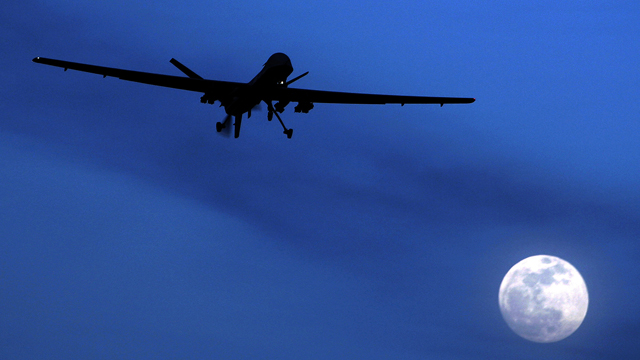
An unmanned U.S. Predator drone flies over Kandahar Air Field, southern Afghanistan, on a moon-lit night, Jan. 31, 2010. (AP Photo/Kirsty Wigglesworth, File)
In his 2009 Nobel Peace Prize speech, President Obama defended the right to engage in “just wars,” evoking a theory of ethical warfare that can be traced back to Saint Augustine, Thomas Aquinas, and even Cicero. Is the administration’s use of unmanned drone strikes compatible with the traditional principles of just war? We asked Daniel Brunstetter, a professor of political science at the University of California, Irvine, who has written about drones and just war theory for The Atlantic and the journal Ethics & International Affairs.
Lauren Feeney: What is “just war theory?”
Daniel Brunstetter: Just war theory is a shared moral language that helps us facilitate our evaluation of the way in which statesmen can use force. I’ve heard it said that President Obama has been an avid reader of Augustine or Aquinas and that gives him the necessary knowledge of what just war theory is. One of the misconceptions about just war theory is that there is some book or checklist that you can turn to and say, “Do I satisfy this, do I satisfy that? Okay, great, I can go and wage war.” It’s more of a tradition in which there has been a long conversation dating from the times of Augustine, and it gives us a moral vocabulary that both structures and informs how we think about war and how we legitimize or don’t legitimize the use of force.
Feeney: So there isn’t a set of rules, but what are the main principles?
Brunstetter: You can divide it into three basic categories.
There’s what scholars call the jus ad bellum, which means the justice of war. Within that are six different criteria you can look at to think about whether using force in a particular situation is just: just cause, right intention, last resort, legitimate authority, proportionality, and probability of success. President Obama referred to just cause and last resort in his Nobel Prize speech in 2009, when he said you only wage war in self-defense and when you’ve tried everything else and force is the last reasonable option.
There’s another phase referred to as jus in bello, or justice in war — what you can do during the course of a war — and there are two major principles there: distinction and proportionality. Distinction means distinguishing between combatants and non-combatants and avoiding harm of non-combatants to whatever extent is possible while trying to carry out a military mission. Proportionality means trying to balance the harm inflicted with the overall consequences of that action. You don’t want to carry out a military action that’s going to have long-term or even short-term negative consequences.
Then there’s a final phase which people talk about nowadays, jus post bellum, or justice after war. If you’re using force, you want to think clearly about the outcomes and how to come to a just peace afterwards.
Feeney: Does the use of drone strikes fit within the rules of a just war?
Brunstetter: I think that depends on a couple of things. Take jus ad bellum, or the justice of war. If you read President Obama’s early speeches and look at the National Security Strategy of 2010, you see how his just war philosophy has been a striking critique of President Bush’s philosophy. Obama has sought to limit self-defense to imminent threats rather than Bush’s vague notion of preemption. He’s reinvigorated the idea that you only go to war as a last resort.
Now, the question is, do drones satisfy these criteria? Here’s where we run into a couple of problems. In terms of just cause, it really depends on how imminent the threat is, that is, that the specific targets are actually going to carry out an attack. And in terms of last resort, it depends on if there are other options that we could use instead of lethal force. Could we, for example, try to capture terrorists? Brennan, in his recent speech, said that the U.S. administration prefers to capture, but that it’s exceedingly rare because terrorists or alleged terrorists tend to be in very remote places.
My fear is that President Obama speaks the language of last resort, but his use of drones doesn’t really seem to follow that principle. It’s unclear to me whether and to what extent their use is really a last resort.
Feeney: Is secrecy part of the problem? Maybe if we heard Obama’s justification for any individual drone strike, it could in fact pass muster, but the administration hasn’t been forthcoming with information about these decisions.
Brunstetter:I think you raise a very important point. President Obama’s use of drones is not necessarily unjust according to the standards of just war theory. It could be that there’s an imminent threat of attack and he’s tried everything possible and the threshold of last resort has been crossed. That is clearly a possible scenario, and in fact, the just war tradition would teach you that that would be an instance in which the use of force would be legitimate.
But, as you say, there is very little evidence that we have access to that suggests that this is really the case in all instances. In fact, if we look at some of the patterns across the years, we see a few problematic trends. For one, this whole campaign of signature strikes, especially starting in 2011. Were there other ways in which to quell that threat? I think there may be evidence with which the administration could defend their claims, but without further disclosure, we can’t really know.
Feeney: What about the principle of distinction? We know that a number of civilians have been killed in drone strikes.
Brunstetter: I talked about the jus ad bellum criteria, the justice of war, and raised questions about whether drone strikes really satisfy last resort. I think you can raise equally important questions about whether they satisfy the jus in bello principles of proportionality and distinction. If you listen to the proponents of drones, John Brennan for example — architect of the drone program and Obama’s pick for the head of the CIA — they say that drones are the most humane technology that we’ve ever possessed as human beings. They laud drones for their ability to make pinpoint laser-guided strikes. They call them more proportionate and discriminate than any weapon system in the history of mankind.
Now, that’s probably true. Certainly it’s true if you compare drones to say the firebombing of Dresden. But I don’t think it’s fair to judge proportionality that way. Drones are more proportionate than bombing campaigns and they’re more proportionate than say the Pakistani Army going in and cleaning up the Af-Pak border area. But that doesn’t necessarily mean they are proportionate. The more drone strikes you carry out, the more likely you are, even if you’re very good, to have collateral damage. Now, the just war tradition doesn’t say you can never have collateral damage, but it says you need to take every opportunity to limit that as much as possible, and you can only undertake strikes that are a military necessity. So in my mind it’s not about whether drones are more proportionate than say ground forces but whether all the criteria of just war are being met in the particular strike.
Feeney: Just war theory seems to leave room for quite a bit of war.
Brunstetter: That depends on how you interpret the criteria. I think the purpose of just war theory is to limit the recourse to force, except when it’s absolutely necessary, and to make sure that when you have to go to war or use force, that it’s done in ways that protect, to the greatest extent possible, non-combatants from harm. The challenge is that sometimes just war principles can be manipulated to justify almost any recourse to force. The most obvious example is George W. Bush’s use of the language to justify the Iraq invasion. One of the most common critiques of just war theory is that it is only used to justify war, but it’s also used to challenge or criticize the use of force. If you look at the recent presidential debates, for example, it was used to argue against going to war with Iran. Perhaps if the administration released the relevant documents, we would find that just war criteria were voiced to show how some potential drone strikes were deemed to be unjustified and therefore weren’t carried out. But without access to the facts, I am admittedly skeptical this is the case.
I think what we’re seeing with the Obama Administration is that they’ve placed too much faith in this idea that drones are more proportional than other weapons, and that that gives them this moral leverage to continue to use them. But we need to also take into account the different elements that might affect the long-term success of the various drone campaigns: collateral damage, and how that contributes to anti-American sentiment; what does the post-drone campaign world look like? Without transparency, without drones being woven into the actual U.S. foreign policy in an open way, it’s hard for us to even think about those questions.


